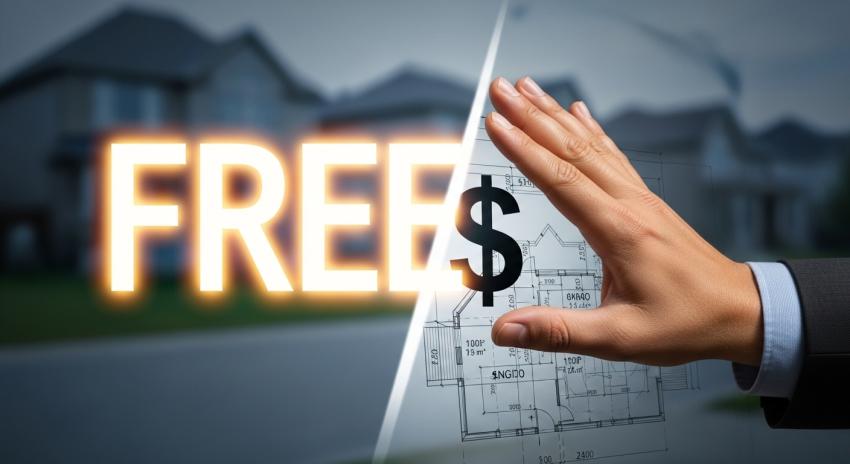
Introduction: The Hunt for the "Free" Number
Let's be honest. If you own a home in Ontario, you're sitting on what is likely your biggest financial asset. And in a market as volatile and exciting as ours, you're probably dying to know one thing: "What's it really worth?"
So, you type "free house appraisal ontario" into Google, and you're flooded with ads. "Get Your Free Home Value Instantly!" "Find Out What Your Home is Worth—FREE!"
It sounds fantastic. But as an expert who has spent years in and around the real estate and financial tech industries, I have to be the one to tell you the hard truth: there is no such thing as a truly "free" professional appraisal.
What you are seeing are three very different products, all marketed as "free." Understanding the difference is the single most important step you can take to protect yourself, whether you're selling, refinancing, or just satisfying your curiosity. Let's break down what you're really getting.
What "Free" Usually Means: The Two Types of Valuations
When a service is free, you are often the product. In this case, your data and your potential business are what these services are after. Here are the two main "free" valuations you'll find.
1. The Instant Online Estimate (AVM)
What it is: This is what most "instant value" websites offer. It's an AVM, or Automated Valuation Model. Think of the "Zestimate" on Zillow, the estimates from banks, or tools like HouseSigma.
How it works: It’s an algorithm. It scrapes public data—tax records, recent sales in your general area, square footage—and spits out a "guesstimate."
The Good: It's incredibly fast (literally seconds) and gives you a decent, "in-the-ballpark" idea of your home's value. It's great for satisfying general curiosity.
The Bad (This is critical): The AVM has never been inside your house.
It doesn't know you spent $80,000 on a stunning kitchen renovation last year.
It doesn't know your neighbour's "comparable" house sold for $50k less because it had a leaky roof and original 1970s shag carpet.
It doesn't know you have a premium ravine-facing lot.
Bottom Line: An AVM is a fun but "dumb" number. It's a starting point, but you should never make a major financial decision based on it.
2. The Real Estate Agent's Opinion (CMA)
What it is: This is the "free home evaluation" offered by a local real estate agent. It's a CMA, or Comparative Market Analysis.
How it works: This is much more accurate than an AVM. A human expert (the agent) will visit your home, see your upgrades, note the condition, and then pull a list of the most relevant, most recent comparable sales ("comps") to determine a suggested listing price.
The Good: It's highly accurate, customized to your home, and based on real-time market data. The agent has been inside your house and understands the value of your upgrades.
The Bad (The "Catch"): It's not free. It's a marketing tool. The agent is providing this valuable service in the hopes of earning your business and securing the listing. It's a sales pitch, which is fine, but you need to know that.
Bottom Line: A CMA is the best "free" valuation you can get. However, it is not a legal appraisal.
When "Free" Fails: Why Lenders Demand a Paid Appraisal
So, you got a CMA from an agent, and you're ready to refinance. You take that CMA to the bank and they say, "Thanks, but no. We're ordering our own appraisal."
Why?
Because a real appraisal is an unbiased, legally binding, third-party report created by a designated professional (a CRA or AACI appraiser).
The Bank's Risk: The bank is lending you hundreds of thousands of dollars, using your house as collateral. They can't accept a CMA from your agent, because your agent (understandably) wants the highest price possible to win your listing. The bank needs a conservative, unbiased opinion of value to protect their investment.
The Legal Standard: A paid appraiser is liable for their valuation. They are bound by strict professional standards. Their report is what holds up in legal situations like a divorce, an estate settlement, or for capital gains tax purposes. A "free" estimate holds no legal weight at all.
This is the key takeaway:
"Free" (AVMs & CMAs) = For CURIOSITY.
"Paid" (Appraisal) = For CERTAINTY.
A Note on Trust: Vetting Your "Free" Digital Sources
In 2025, we have to be smart about where we're getting our free data from. When you use that "instant free estimate" tool, you are giving a company your home address, your email, and your phone number.
How do you know that website is legitimate and not just a data-harvesting scam?
This is where digital trust comes in. As an expert in digital strategy, the first thing I vet is the platform itself.
Does the website look professional and modern, or like it was built in 1999?
Is it secure? Look for the "https" and padlock icon.
The best, most reputable real estate and mortgage firms invest heavily in their online presence. They use [professional web development] to ensure their sites are fast, secure, and protect your data.
Furthermore, when an agent or broker does want to share your sensitive financial documents, they shouldn't be using generic email. The standard of care now is to use secure, [custom digital platforms] or portals that encrypt your information.
If a "free" tool looks sketchy and insecure, trust your gut. Your personal data is worth more than a bad guesstimate.
So, How Can I Actually Get a "Free House Appraisal in Ontario"?
I know, I know. You came here looking for "free." There is one way this can happen.
Often, when you are refinancing or switching your mortgage, a bank or mortgage broker will run a promotion. They might say, "Sign with us, and we'll cover the cost of your appraisal."
In this case, you are getting a full, professional, paid appraisal... for free. The lender is simply paying the $400-$600 fee on your behalf as an incentive to get your business. This is the only scenario where "free house appraisal" and "professional report" mean the same thing.
Conclusion: Use "Free" to Dream, Pay for "Certainty"
My final advice? Use all the tools!
Start with a free AVM online to get a quick-and-dirty ballpark number.
If you're serious about selling, call a local real estate agent for a free, high-quality CMA.
And if you're refinancing, switching lenders, or dealing with a legal matter, be prepared to pay the $400-$600 fee for a real, professional appraisal.
That paid report isn't a cost; it's an investment in certainty. And in the high-stakes Ontario housing market, certainty is priceless.




